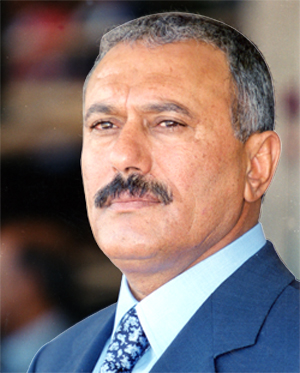Yemen Feature: Locals "We Have Bigger Problems Than Al Qa'eda" (Kasinof)
 Ali Abdullah SalehLaura Kasinof reports for The New York Times:
Ali Abdullah SalehLaura Kasinof reports for The New York Times:
On the streets of Sana'a, the nation’s conflict-stricken capital, the news of the death of Anwar al-Awlaki, the Yemeni-American propagandist for Al Qaeda who inspired jihadists around the world, was largely overshadowed by the continuing domestic turmoil here.
Many Yemenis had not even heard that Mr. Awlaki had been killed, even by Friday night. And most had only a faint sense of why the United States considered him a highly significant target. If anything, Yemenis thought his death would only increase their woes.
“I don’t know why he was important, except that he was a terrorist,” said Belal Masood, who works in a restaurant in Sana'a’s old city. “But maybe this will create a problem for us Yemenis, because when you strike Al Qaeda they normally strike back larger. Really, we wish they could have killed him in another country.”
Another man, Walid Seneb, who was sitting on a street curb with three friends on Friday night, said, “We don’t like these terrorists who make problems for us. Mr. Seneb was the only one of the four men who had heard of the cleric’s death.
“But right now there are worse problems,” he said. “Our national crisis is the biggest problem. There is no water, electricity, everything from the government stopped.”
After eight months of antigovernment protests that began during the Arab spring, Yemen’s government has been torn apart. The armed forces are divided between those loyal to President Ali Abdullah Saleh and those who follow a rebel military commander. Conflict between the two sides turned into urban warfare in Sana two weeks ago, with over 100 people being killed. With fears that a large-scale civil war may break out and a debilitating economic crisis , Yemenis are sufficiently absorbed with their own problems that they do not have much time or attention to devote to the death of a man who was most known for reaching out to the English-speaking world of Muslim extremists.
“Awlaki’s life or death doesn’t matter for Yemenis,” said Nadwa al-Dawsari, who works for a nonprofit organization in Sana. “It is not a priority for us. Not many Yemenis know who Awlaki was anyway. It doesn’t matter how many Al Qaeda members are killed as long as the underlying causes that makes extremism thrive exist.”
But a major concern for some, especially among Yemenis in the opposition, is that the Saleh family provided information to the United States on Mr. Awlaki’s whereabouts to gain political favor.
Although the Obama administration has been working diplomatically to find a way to ease Mr. Saleh from office, his family controls the security apparatus responsible for counterterrorism activities. They know that Mr. Awlaki’s death was coveted by the United States, and they fear that it will somehow alter the administration’s desire to have Mr. Saleh give up power.
“Now he is going to show the people he can kill al Qaeda,” Nader al-Qershi, a youth organizer at Sana’s large antigovernment demonstration, said of Mr. Saleh. “That there is al Qaeda in Yemen, and who can kill them except Ali Abdullah Saleh?
“Why does Ali Abdullah Saleh kill him at this time? He has a lot of information about these people in Al Qaeda. The protesters at the university are happy about this action, but we just want to know why it happened at this time.”

 Sunday, October 2, 2011 at 10:34
Sunday, October 2, 2011 at 10:34
Reader Comments